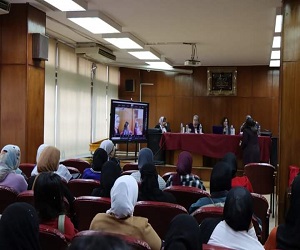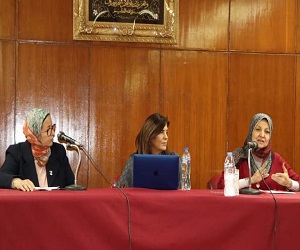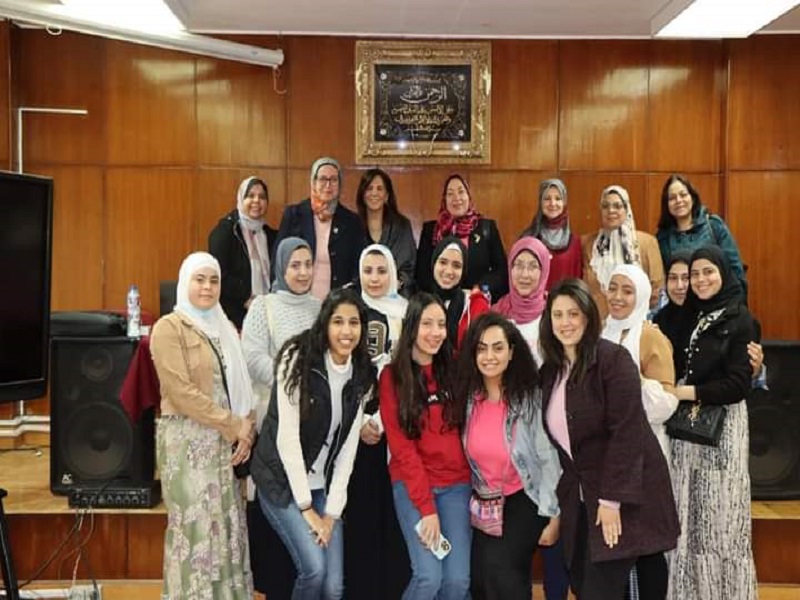"Women in the Leadership Position" ... Seminar at the Faculty of Girls
The Scientific Publishing Unit of the Faculty of Girls for Arts, Sciences, and Education, at Ain Shams University, and the International Journal of Women and Child Studies held a symposium on the occasion of Women's Day, entitled "Women in Leadership", under the auspices of Prof. Amira Youssef, Dean of the Faculty, and Prof. Hanan Al Shaer, Vice Dean for Postgraduate Studies and Research, and in cooperation with the Women's Organization Arabic, and Prof. Azza Khalil, editor manager of the International Journal of Women and Child Studies, moderated the symposium.
The symposium began with the speech of the organization, which was delivered by Dr. Hind Mustafa Al Shalakany, Director of Studies, Publishing, and Information at the organization, who sent a number of short messages regarding the position of women in the position of leadership, stating that leadership is mainly related to the ability to carry out various tasks and that whoever occupies the position of leadership must be characterized by specific personal features, and the ability to influence others regardless of being a man or a woman. The second message is that women's leadership not only benefits women, but also extends its benefit to society as a whole, as the presence of women in these positions reflects the principle of justice in representation, and that among the reasons for the lack of justice is the gender pattern and societal expectations of women, in addition to the existence of a certain structure of relationships, and therefore it is possible Saying that women's leadership is a cultural issue par excellence. In the end, she shed light on the importance of the concept of empowering women, and the activities of the organization to empower women and spread awareness that fights the stereotypical vision of the role of women.
This was followed by an intervention by Dr. Sahar Shaarawy, a teacher in the Department of Psychology, who talked about equality between men and women on the religious and historical level, and that women really have multiple roles in all areas of life. Egyptian women have occupied many professions since the beginning of the century and were pioneers in these fields.
 |
 |
She also referred to the results of studies that proved that a higher level of women's education leads to an increase in their administrative capabilities, and this has already been proven by women occupying a number of qualitative professions in the technological, engineering, and medical fields.
This was followed by the presentation of the Associate Professor, of the Department of Arab Islamic Civilization at the American University in Cairo, Dr. Huda Al-Saadi, where she explained through her speech that the term women's leadership and independence already exists in our Arab and Islamic heritage. She explained how historians reflected the image of women in a position of leadership, or in other words, how women were portrayed through the writings of historians.
Her study included how women from the upper classes of society were represented, as well as simply marginalized women, through state documents such as records of Sharia courts in the Ottoman Empire period. It also turned out that women had a role in the public sphere in various professions in the religious, political, and economic fields. The importance of this study lies in the fact that history can be an effective tool for changing reality at the present time.
In conclusion, Dr. Sawsan Al-Sharif, a social and psychological expert, and a writer of short stories and poetry compared the status of women in the Arab world and the Western world historically, as she explained that women in the West had fewer rights compared to women in the Arab and Islamic world.
It also dealt with the image of women in contemporary Egyptian literature, and called for the need for the religious and cultural discourse to focus, in addition to its focus on the duties of the woman and the wife, on the duties of the husband and the man as well, as there should not be a focus on the duties of one party without the other party in the family equation, as well I analyzed how the spotlight is shed on women writers and how often their literary achievements are ignored or mentioned in a shorthand manner, in exchange for shedding light on their private lives in an unfair way against them. Examples of a women writer are writer May Ziada, whose literary production reflects her high-end creativity, but many do not know much about this production, in contrast to what is rumored about her private life.
At the end of the symposium, rich discussions took place between the attendees and the lecturers at the symposium on a number of issues related to women's leadership and the stereotyped image of their leadership capabilities. The symposium resulted in a number of recommendations, the most important of which is the support of the media and culture media for the image of women in the role of leadership and equality between them and men.


.svg)




